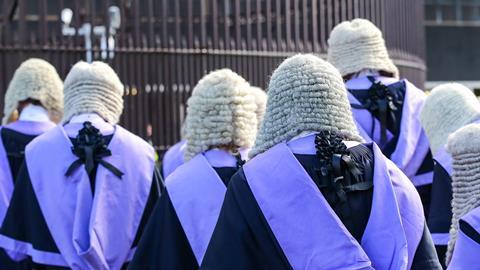A new policy designed to remove judges from office if they have been long absent from work due to ill health would be unconstitutional, a support network for judges has told the government.
The Gazette has learned that, for the past three months, the Ministry of Justice has been consulting on a ‘removal process for judges on grounds of long-term ill-health absence’ that could come into force next April.
The removal process would begin after 12 months’ continuous absence, where there is no ‘realistic prospect’ of the judicial office holder returning to work imminently, or before 12 months if the medical evidence states that there is no realistic prospect of the judge returning to work within a year. In certain circumstances, two periods of continuous sickness absence could be linked and treated as a single absence.
The absence would first be reviewed by a leadership judge. If the case is referred to the lord chief justice or senior president of tribunals, they would decide whether to appoint a nominated judge to make a recommendation or refer the case back to the leadership judge. The judicial office-holder can appeal the nominated judge’s recommendation.
The removal policy would apply only to office-holders below High Court level because under the Senior Courts Act 1981, to remove a High Court judge requires an address presented to the monarch by both houses of parliament.
An equality statement attached to the consultation paper states that a salaried judge under 55 'may be left without a means of income if they are removed from office on ill-health grounds before pensionable age in circumstances where ill-health retirement is not feasible. Given the vast majority of salaried judges (75%) are above the age of 50 and the number of judges across all jurisdictions absent for longer than 12 months is so low... the above scenario can be considered very exceptional and likely to affect a very small number of individuals, if any'.
The equality statement says the government does not have 'reliable data' for disability of judicial office holders, but assumes that health problems related to disability could lead to longer-term sickness absence. However, if the policy results in indirect discrimination, 'then it is our view that this is justified as a proportionate means of achieving the legitimate aim of ensuring that the judiciary can be fully resourced and deployed in such a way that access to justice is not hindered by rare cases of long-term absence'.
The Judicial Support Network, in its consultation response, said implementing the policy would make an ‘unconstitutional and controversial change’ to judicial security of tenure ‘at the very time when efforts are needed to repair the credibility of judiciary and judicial recruitment in light of controversies well-rehearsed in the press (such as over statutory consultation)’.
A central principle of the UN Convention on Human Rights and Commonwealth law is that the constitutional position of all judges is equally protected, the network said. ‘In line with this, the specific provisions of the Constitutional Reform Act 2005 concerning the removal from office of High Court judges apply equally to all judges.’
The network found ‘serious equalities issues’ arising from the proposals, ‘targeting as they do judges who cannot work for incapacity reasons for removal of tenure’.
This article is now closed for comment.




























9 Readers' comments